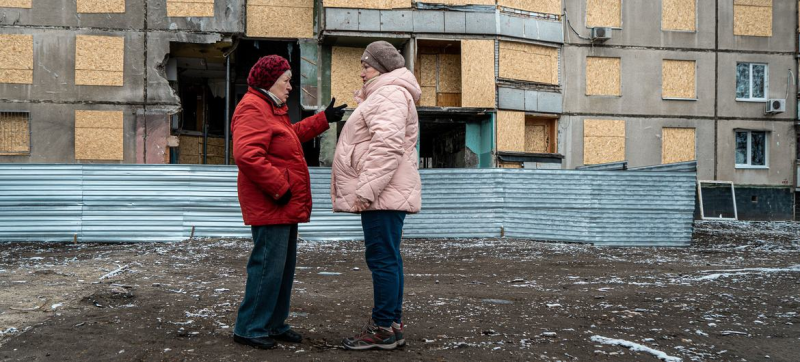- As debate over the location of climate conference razes on, will COP fail this time too? |
- UN Rights Office Warns of Gaza Escalation, West Bank Annexation |
- UN Warns Wildfires and Climate Change Worsen Air Quality |
- OIC Hails Belgian Declaration of Intent to Recognize Palestinian State |
- Bomb blast kills 15 near political rally in Pakistan |
Ukraine’s War Leaves Deep Mental Health Scars on Women

Two women stand in front of their damaged home in Kharkiv, Ukraine.
Nearly four years into Russia’s full-scale invasion of Ukraine, and 11 years since the conflict began, the toll on mental health across the country is severe.
Speaking from Kyiv – which was rocked by some of the deadliest attacks of the war last week – and after a visit to the frontline region of Sumy, UN Women’s Representative in Ukraine, Sabine Freizer Gunes, described both the exhaustion and resilience she has witnessed.
“Living in a war zone like Ukraine is quite challenging,” Ms. Gunes said. “As UN officials, we are not allowed to bring our families here, so one difficulty is living far away from them.
“Usually, the attacks happen at night. The challenge is getting through the week when you are woken up multiple times. Sometimes there are several days of strikes in a row; sometimes it’s quiet for a week. Not knowing if you’ll sleep through the night, or have to run to the shelter, is mentally exhausting. It’s not so much fear, it’s uncertainty.”
Ms. Gunes noted that many Ukrainians are choosing to remain in frontline communities, despite the risks. “I just came back from Sumy, 20 kilometres from the Russian border, and the city is still vibrant. Businesses continue, cafes and shops are open, people are walking in the streets. But tragedy can strike at any moment.”
UN Women works closely with local women’s organisations, particularly to support elderly women who are often the last to leave their homes. “We provide kits with basic items so they can stay in their houses,” she explained. “These organisations also run cultural events, youth activities, legal and psychosocial support, and help women gain skills to start businesses.”
One of the most moving stories she recalled was meeting six women NGO leaders. “We asked them how our support had helped. I thought they would mention material aid. Instead, they said the retreat we organised in western Ukraine gave them their first chance in years to rest, to share experiences, and to sleep. One woman said it was the first time in three years she had a proper night’s sleep.”
According to Ms. Gunes, nearly everyone living in Ukraine today faces mental health challenges. UN Women integrates mental health support into all its programmes.
She also pointed to conflict-related sexual violence as a hidden but widespread issue. The UN has documented 484 cases, though the true number is believed to be much higher, especially in Russian-occupied territories. “What is striking is that most recorded cases are against men, largely in detention settings. Survivors need extensive psychological support,” she stressed.
A major concern now is the impact of funding cuts. A recent UN Women survey of 100 women’s organisations found that 73 per cent had already experienced severe disruptions, while 32 per cent feared closure within six months. Around 67 per cent had to lay off staff, and 60 per cent reduced or suspended gender-based violence services.
“This is directly affecting women’s lives,” Ms. Gunes warned. “Imagine being in an abusive relationship, knowing there is a shelter nearby, and then finding it closed because there is no funding.”

